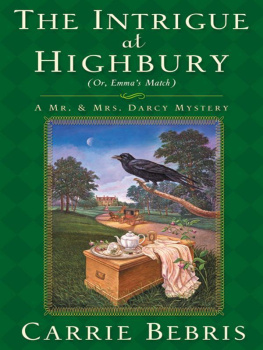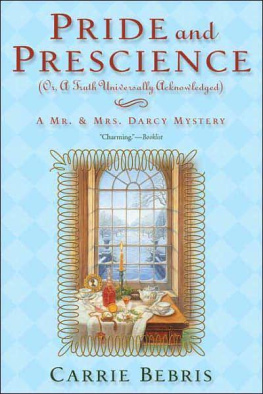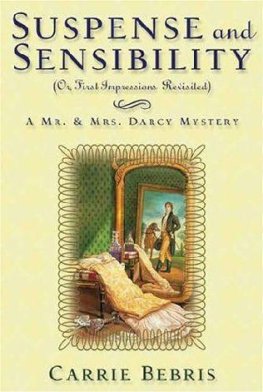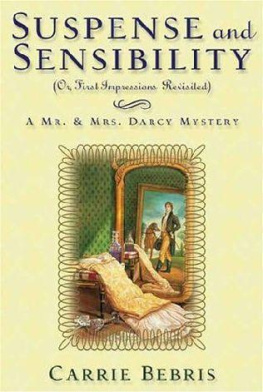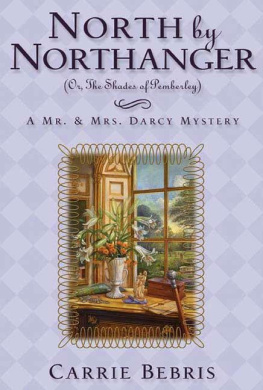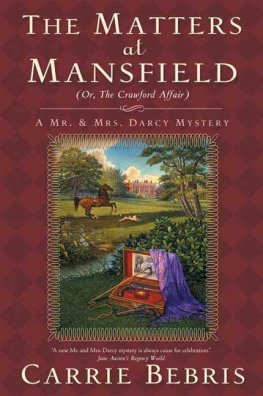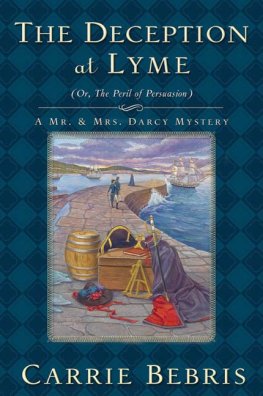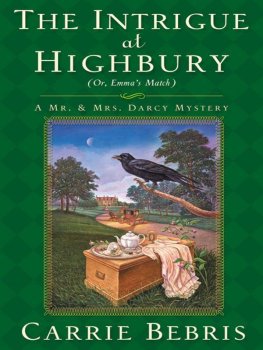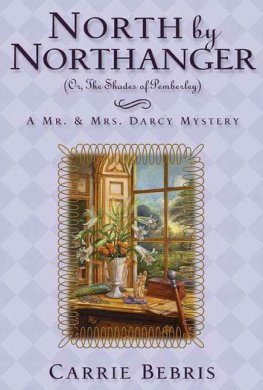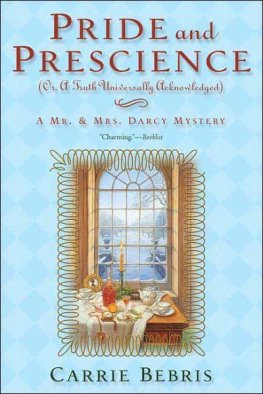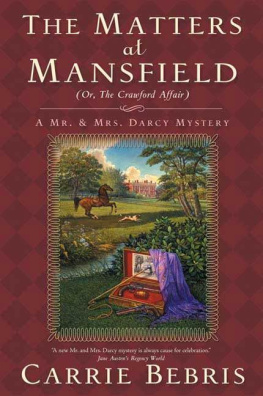Annotation
Mr. and Mrs. Darcy are looking forward to a relaxing stay with dear friends when their carriage is hailed by a damsel-in-distress outside of the village of Highbury. Little do the Darcys realize that gypsies roam these woods, or that both their possessions and the woman are about to vanish into the night. The Darcys seek out the parish magistrate, who is having a difficult evening of his own. Mr. Knightley and his new wife, the former Miss Emma Woodhouse (the heroine of Jane Austen's Emma) are hosting a party to celebrate the marriage of their friends, Mr. Frank Churchill and Miss Jane Fairfax. During dinner, Mr. Edgar Churchill, uncle and adoptive father of the groom, falls suddenly ill and dies. The cause of death: poison. When the Darcys and the Knightleys join forces to investigate the crimes, they discover that the robbery and Edgar Churchill's death may be connected. Together they must work to quickly locate the source of the poison and the murderer's motive -- before the killer can strike again.
Carrie Bebris
The Intrigue at Highbury
or, Emma's Match
To Anne Klemm
and
Brian M. Thomsen
Acknowledgments
A book is seldom the product of a single individual. And while all books present challenges during the gestational process, this one had more than the usual number, and I am grateful to the many individuals who supported me in ways large and small during its creation.
First, I thank my family. Living with a writer is no easy thing, and I appreciate their patience, understanding, and sacrifices that granted me the time and space to write. My father, especially, took on several responsibilities at various points that further freed me to withdraw to the world of Highbury.
The value of a good editor cannot be overstated, and I have been blessed with more than one. Brian M. Thomsen believed in the Mr. & Mrs. Darcy series from the start, and helped me shape it as the Darcys' adventures continued in successive books. His favorite Jane Austen novel was Emma, the story on which The Intrigue at Highbury is based, and he very much looked forward to this novel. Unfortunately, while I was writing the manuscript, Brian passed away. I miss not only his editorial guidance but also his friendship. Farewell, Brian, and thank you.
The Darcys and I are now under the editorial direction of Kristin Sevick, who is a joy to work with and whose fresh perspective is a boon. Kristin's skill, enthusiasm, and humor helped make the transition as smooth as any such change could be. I am very grateful to have landed in her hands and look forward to continuing our new relationship.
My longtime friend Anne Klemm has provided assistance throughout the life of the series, from helping me refine premises and plots to accompanying me on research trips (adventures of their own!) to offering criticism of early drafts. While I have always appreciated her help, with this book I am particularly grateful for her continued support.
Thanks also to my agent, Irene Goodman, for her wisdom and sound advice; to artist Teresa Fasolino for another beautiful cover painting; to Dot Lin for her enthusiastic promotion of the series; and to fellow writers Mary Holmes, Pamela Johnson, Victoria Hinshaw, and Sharon Short for their creative encouragement and friendship.
Once again, I wish to recognize the Jane Austen Society of North America, particularly those members -- friends -- who have generously shared their specialized knowledge of Regency life. I am indebted to Martha Caprarotta for her seamstress expertise and to Dr. Cheryl Kinney for information about poison and nineteenth-century postmortem practices.
Finally, I thank you, my readers -- for your notes and e-mails, for your interest in the series, and, most of all, for wanting, like me, to enjoy the Darcys' company awhile longer.
"I do believe... this is the most troublesome parish that ever was."
-- Mrs. Elton,
EmmaPrologue
A young lady who faints, must be recovered; questions must be answered, and surprises explained.
--
EmmaThe woman appeared in the road ahead, seemingly out of nowhere. In the twilight and the distance, her features were indistinct, save for the pale hair that tumbled about her shoulders. Were it not for the white dress that caught the light of the rising moon, the coachman might not have seen her at all. As it was, the crescent struggling for dominance against temperamental autumn clouds barely illuminated the figure, lending her such an ethereal cast that she might have been mistaken for an apparition, one left wandering the woods two nights after All Souls' Day had released her fellow spirits from their suffering.
Her cry, however, was unmistakably human.
It pierced the darkness, overpowered the rattle of harnesses and thud of horses' hooves, penetrated the carriage walls to startle Elizabeth Darcy from the slumber into which she had just drifted.
She opened her eyes and instinctively looked toward her husband. So little light reached the inside of the coach that she could barely distinguish his silhouette. Disoriented from having wakened so abruptly in an unfamiliar place, her next thoughts went to their infant daughter. Her anxiety eased momentarily when she recalled that Lily-Anne was safe in their London townhouse with Darcy's sister, but her heart raced as the coachman, Jeffrey, brought the horses to a stop.
"There's a woman ahead, sir," said Jeffrey. Though the coachman remained seated, the body of the carriage rocked slightly as the groom disembarked to take hold of the lead pair of horses. "Coming towards us," Jeffrey continued. "Looks like she's limping."
"Is she alone?" Mr. Darcy asked.
"Yes, sir."
Darcy pressed his wife's hand. "Remain here."
He quit the carriage. The light that had illuminated their path gradually receded, indicating that Darcy had removed the lantern from the front of the vehicle and carried it with him. The rear lantern remained, so the carriage was not left in total darkness.
"Oh, a gentleman!" Elizabeth heard the stranger exclaim. "Thank goodness! Can you help me, sir?"
"What is the trouble?"
The light diminished further. In the increased darkness, still disoriented by sleep, Elizabeth tried to gain her bearings.
They were traveling to Sussex, she reminded herself, to visit Darcy's cousins Colonel and Anne Fitzwilliam. The newlyweds had recently taken possession of Brierwood, a property Anne's mother had settled upon her following her marriage, and the Darcys were to be the couple's first guests. The letter of invitation from Anne had included a confidential admission that had delighted Elizabeth and inspired them to bring a family heirloom: a set of christening clothes. The priceless garments had been passed down through generations of Darcy's maternal line, and all looked forward to the newest member of the family wearing them within the year. They also brought another gift for Anne, a gold signet ring worn by Darcy's late mother, the beloved aunt for whom Anne had been named.
Elizabeth was starting to doubt, however, whether they would ever arrive to present the gifts. The journey south from Derbyshire to London had been plagued by so many delays that they had left Lily-Anne behind with Darcy's sister, Georgiana, to rest from the rigors of travel before continuing on. It had been a fortuitous decision, as a loose wheel had slowed their progress still more after leaving town. Now, instead of reaching Brierwood today as planned, they found themselves only as far as Surrey. They intended to stop for the night in the next village, Highbury, where they understood a decent inn could be found. When they realized they would be further delayed, the Darcys had sent their personal servants and the heaviest luggage ahead by public coach to meet them at the inn. They traveled with only the small chest containing the ring and baptismal gown.

